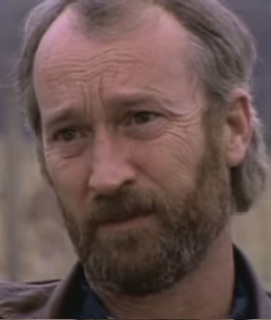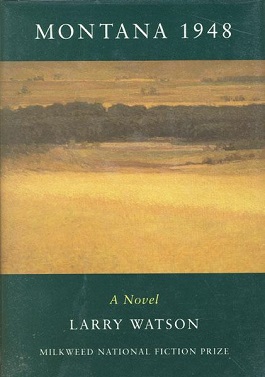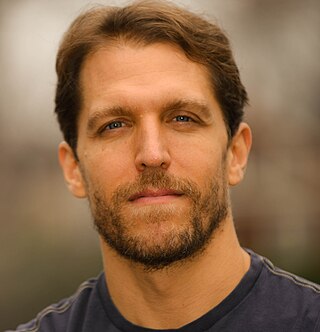Related Research Articles

William Larry Brown was an American novelist, non-fiction, and short story writer. He received numerous awards during his lifetime, including the Mississippi Institute of Arts and Letters award for fiction, the Lila Wallace-Reader's Digest Award, and Mississippi's Governor's Award For Excellence in the Arts. Brown was also the first two-time winner of the Southern Book Award for Fiction.

Ivan Doig was an American author and novelist, widely known for his sixteen fiction and non-fiction books set mostly in his native Montana, celebrating the landscape and people of the post-war American West.

Raymond Federman was a French–American novelist and academic, known also for poetry, essays, translations, and criticism. He held positions at the University at Buffalo from 1973 to 1999, when he was appointed Distinguished Emeritus Professor. Federman was a writer in the experimental style, one that sought to deconstruct traditional prose. This type of writing is quite prevalent in his book Double or Nothing, in which the linear narrative of the story has been broken down and restructured so as to be nearly incoherent. Words are also often arranged on pages to resemble images or to suggest repetitious themes.
Mark V. Ziesing is an American small press publisher and bookseller, founded by Mark Ziesing. Active as a bookseller, from 1972 to present; Ziesing was in publishing, from the mid-1980s into 1998. The Ziesing publishing imprint specialized in science fiction, horror, and other forms of speculative fiction. Originally based in Willimantic, Connecticut and in partnership with his brother Michael, he published two books by Gene Wolfe under the name Ziesing Brothers.

Larry Alfred Woiwode was an American writer from North Dakota, where he was the state's Poet Laureate from 1995 until his death. His work appeared in The New Yorker, Esquire, The Atlantic Monthly, Harpers, Gentleman's Quarterly, The Partisan Review and The Paris Review. He was the author of five novels; two collections of short stories; a commentary titled "Acts"; a biography of the Gold Seal founder and entrepreneur, Harold Schafer, Aristocrat of the West; a book of poetry, Even Tide; and reviews and essays and essay-reviews that appeared in dozens of publications, including The New York Times and The Washington Post Book World. He received North Dakota's highest honor, the Theodore Roosevelt Rough Rider Award, in 1992.
Janet Peery is an American short story writer and novelist.
Melanie Rae Thon is an American fiction writer known for work that moves beyond and between genres, erasing the boundaries between them as it explores diversity, permeability, and interdependence from a multitude of human and more-than-human perspectives.
John Dunning was an American writer of non-fiction and detective fiction. He was known for his reference books on old-time radio and his series of mysteries featuring Denver bookseller and ex-policeman Cliff Janeway.

Milkweed is a 2003 young adult historical fiction novel by American author Jerry Spinelli. The book is about a boy in Warsaw, Poland in the years of World War II during the Holocaust. Over time he is taken in by a Jewish group of orphans and he must avoid the Nazis while living on the streets with other orphans. Despite being a historical fiction novel, Doctor Korczak, a minor character in the story is based on a real person named Janusz Korczak.

Montana 1948 is a 1993 novella by Larry Watson. The novella focuses on the life of young Montanan David Hayden, his family and the fictional town of Bentrock, Montana, and focuses on the struggles of a family torn between loyalty and justice. It was awarded the Milkweed National Fiction Prize.
Mona Susan Power is an Native American author based in Saint Paul, Minnesota. Her debut novel, The Grass Dancer (1994), received the 1995 Hemingway Foundation/PEN Award for Best First Fiction.

Deni Ellis Béchard, also known as Deni Yvan Béchard is a Canadian-American novelist.
Mary Rose O'Reilley is an American poet, novelist, and writer of non-fiction.
Melanie Sumner is an American writer and college professor. She was acclaimed as one of "America's Best Young Novelists" in 1995. Writer Jill McCorkle says, "She comes to her characters with this wealth of knowledge. She's so well-versed in those wonderful little details that make up Southern towns. She has such a rich expanse of her fictional turf wildly varied and yet always occupied with this kind of social manners and morals and taboos."

William Roorbach is an American novelist, short story and nature writer, memoirist, journalist, blogger and critic. He has authored fiction and nonfiction works including Big Bend, which won the Flannery O'Connor Award for Short Fiction and the O. Henry Prize. Roorbach's memoir in nature, Temple Stream, won the Maine Literary Award for Nonfiction, 2005. His novel, Life Among Giants, won the 2013 Maine Literary Award for Fiction.[18] And The Remedy for Love, also a novel, was one of six finalists for the 2014 Kirkus Fiction Prize. His book, The Girl of the Lake, is a short story collection published in June 2017. His most recent novel is Lucky Turtle, published in 2022.

Jill Collins McCorkle is an American short story writer and novelist.

Mary Louise Defender Wilson, also known by her Dakotah name Wagmuhawin, is a storyteller, traditionalist, historian, scholar and educator of the Dakotah/Hidatsa people and a former director working in health care organizations. Her cultural work has been recognized with a National Heritage Fellowship in 1999 and a United States Artists fellowship in 2015, among many other honors.
Dan Louie Flores is an American writer and historian who specializes in cultural and environmental studies of the American West. He held the A.B. Hammond Chair in Western History at the University of Montana in Missoula, Montana until he retired in May 2014.

Carrie Brown is an American novelist. She is the author of seven novels and a collection of short stories. Her most recent novel, The Stargazer's Sister, was published by Pantheon Books in January 2016.
Miriam Karmel is an American writer. Her first novel, Being Esther (2013), is one of only a few involving characters in their eighties.
References
- ↑ "Author Larry Watson appears at BSC Campus Read". Bismarck State College. February 23, 2014. Retrieved November 25, 2015.
- ↑ Biographical data included with Montana 1948. Milkweed Editions. 1993. ISBN 9780915943135.
- 1 2 "Biography - Larry Watson". www.larry-watson.com. Retrieved 2017-10-12.
- ↑ Rogers, Ken (1993-09-26). "Prairie writer takes serious approach to telling stories". The Bismarck Tribune . Bismarck, North Dakota . Retrieved 2021-05-05.
- 1 2 Mills, Steve (2012-02-26). "Plain-spoken man: Larry Watson writes with quiet power nearly 20 years after 'Montana 1948'". Chicago Tribune . Chicago, Illinois. Retrieved 2021-05-05.
- ↑ Klecker, Mara (2020-12-28). "High school halts teaching of 2 books". Star Tribune . Minneapolis, Minnesota. Retrieved 2021-05-05.
- ↑ Danielson, Lynn (2006-04-17). "Libraries to bring Watson for 2 events". The Capital Times . Madison, Wisconsin . Retrieved 2021-05-05.
- ↑ Let Him Go
- ↑ Larry Watson (April 1998). In a Dark Time. Simon and Schuster. ISBN 978-0-671-55164-3.
- ↑ Mountains and Plains Independent Booksellers Association Award Archived 2008-12-11 at the Wayback Machine